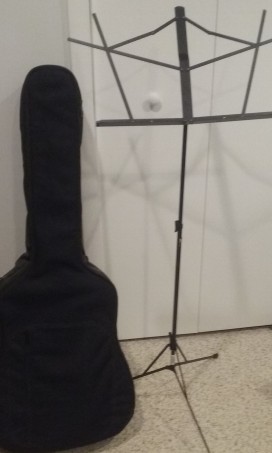On Being Alone: An Unanticipated Thanksgiving
I had moved into my new apartment in Summerville, SC just five days before Thanksgiving and two weeks into a new job, which I took to start a new career in counseling, more than 500 miles from where I had called “home” for nearly three decades, Maryland. It was too soon to fly back to see family for the holiday, and too ominous to face the Thanksgiving Day and subsequent weekend travel frenzies. Besides, my kids were scattered – my daughter in France for her post-college job teaching English and my son visiting his mother in Texas.
So I resigned myself to that most melancholia of situations that Americans seek desperately to avoid – spending a hyped holiday alone. I was too new in my adopted hometown to be taken in as a Thanksgiving orphan – barely anybody even knew I existed here, save for my new work colleagues and one college alum.
I was destined to join those invisible people who had nowhere to go for a holiday that screamed Americana, with its pilgrim, culinary, family, togetherness and football customs, and nobody coming to visit them – the stereotypical widowers, spinsters, shut-ins, homeless, outcasts, infirm, aged, black sheep, oddballs, cat ladies, mountain men, lone wolves, eccentrics, hermits, hoarders , rejects and recluses.
I searched for a volunteer opportunity to serve meals to the less fortunate on Thanksgiving Day, but couldn’t find one. A big meal-serving charity in Charleston already was overloaded with volunteers and could accept no more, and other organizations needed help in the days before Thanksgiving. I settled on volunteering for the Turkey Day Run 5K in Charleston, SC, a big fund-raising event. That got me out at 6 a.m. and occupied me on a chilly, rainy day until 10:30 a.m.
For the preceding week, a common salutation with clients at work, exchanged both ways, was “Have a good Thanksgiving,” or, “So what are you doing for Thanksgiving?” constant reminders that I was doing nothing for Thanksgiving and that Thanksgiving, if I stayed strong mentally and emotionally, would be no worse than any other day, but certainly not “good” or “happy” in the traditional sense of celebrating a sacred time with friends and loved ones.
When I returned to my apartment, I did what anyone would do on a rainy day holiday

My “chair” and “table” in my Spartan apartment
with nowhere to go and nobody to entertain – took a long nap to sleep some of the day away. If spending a uniquely American holiday alone was melancholy to begin with, it was amplified by my current Spartan living conditions. I have no furniture – none. My place is bare, except for the air mattress serving as my bed, a food cooler as my chair and a plastic container as my dining table. I could not fit any furniture in my car on the move down, and I won’t be returning “home” to retrieve furniture and pack a rental truck for another two weeks. Not even a TV or a stereo or Internet. Silence. Just me and books. On my Thanksgiving menu: catfish and frozen sweet potato fries.
When I awoke around 4, I decided to get out of my threadbare confines and bring my computer to the apartment complex’s clubhouse, where I could get Internet connection and watch the football games. I predicted I would have the place to myself, as other residents would be celebrating Thanksgiving with friends and family elsewhere. As I approached the clubhouse, I saw a bunch of people mingling inside.
“Oh, great. Booked for a private party,” I thought. “Looks like back to my apartment for catfish and a book.”
But I decided to check to make sure.
“Is this a private party?” I asked the woman who greeted me at the door.
“No, come on in. We’re The Misfits,” she replied.
“Are you sure?” I asked, still feeling as though I was crashing a closed event. “I didn’t bring anything.”
“Don’t worry about it. We’ve got plenty,” she replied.
I entered to find about 40 people, from toddlers to grandparents, celebrating around a veritable Thanksgiving buffet feast. Turns out, The Misfits were what my greeter called “implants” – well, she meant “transplants,” not people with dental work – people at the apartment complex and their friends who had moved to South Carolina from elsewhere and had no family nearby. They had been gathering for holidays and other events for several years.
I stayed for several hours, stuffing myself, watching football, and meeting friendly people in a festive environment. It sure beat being alone, and made for a surprising, grateful Thanksgiving.
That said, being alone is not dreadful. It does not equate to sadness, depression, or even necessarily loneliness. It’s not to be feared. I often embrace solitude, and have done and continue to do many things by myself, even though I enjoy social activities, spending time with friends and being a family man. Enjoying solitary pursuits and engaging in social endeavors are not mutually exclusive. I’m an introvert. I am often more inspired by things I do alone than energized by being around lots of people. But that doesn’t mean I don’t like a good party or social outings.
Being alone is about being comfortable with the self, and knowing that it is a condition that one can change if desired. It is about finding things to do that one values and from which one derives pleasure when undertaken alone. It is about feeling worthy and valuable as a human being, even if one is alone, at least temporarily. It is about being comfortable turning inward and exploring the messages of one’s own soul – the often hidden wants as well as the often elusive sense of peace and acceptance, the true self – rather than constantly craving and responding to external stimuli. It is about having the chance to slow down, quiet the mind, reflect and recharge, and direct one’s energies toward passions, free from the pulls and distractions of others’ wants, needs, expectations and demands.
By twist of fate, my 2017 Thanksgiving combined both ends of the spectrum – aloneness and togetherness. I give thanks for both in my life.


 At neighborhood events, I often see my former guitar teacher, my neighbor who has a guitar studio within walking distance where I once took lessons. And then, inevitably, a wave of regret and guilt washes over me.
At neighborhood events, I often see my former guitar teacher, my neighbor who has a guitar studio within walking distance where I once took lessons. And then, inevitably, a wave of regret and guilt washes over me. he opportunity to self-direct my future, embrace an entrepreneurial spirit, contribute value to society and work flexibly, creatively, collaboratively and independently. I explored life-coaching, completing a series of training courses, but ultimately didn’t pursue it. But the idea of
he opportunity to self-direct my future, embrace an entrepreneurial spirit, contribute value to society and work flexibly, creatively, collaboratively and independently. I explored life-coaching, completing a series of training courses, but ultimately didn’t pursue it. But the idea of